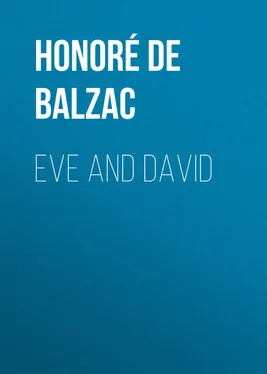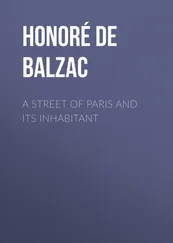Honoré Balzac - Eve and David
Здесь есть возможность читать онлайн «Honoré Balzac - Eve and David» — ознакомительный отрывок электронной книги совершенно бесплатно, а после прочтения отрывка купить полную версию. В некоторых случаях можно слушать аудио, скачать через торрент в формате fb2 и присутствует краткое содержание. Жанр: literature_19, foreign_antique, foreign_prose, на английском языке. Описание произведения, (предисловие) а так же отзывы посетителей доступны на портале библиотеки ЛибКат.
- Название:Eve and David
- Автор:
- Жанр:
- Год:неизвестен
- ISBN:нет данных
- Рейтинг книги:3 / 5. Голосов: 1
-
Избранное:Добавить в избранное
- Отзывы:
-
Ваша оценка:
- 60
- 1
- 2
- 3
- 4
- 5
Eve and David: краткое содержание, описание и аннотация
Предлагаем к чтению аннотацию, описание, краткое содержание или предисловие (зависит от того, что написал сам автор книги «Eve and David»). Если вы не нашли необходимую информацию о книге — напишите в комментариях, мы постараемся отыскать её.
Eve and David — читать онлайн ознакомительный отрывок
Ниже представлен текст книги, разбитый по страницам. Система сохранения места последней прочитанной страницы, позволяет с удобством читать онлайн бесплатно книгу «Eve and David», без необходимости каждый раз заново искать на чём Вы остановились. Поставьте закладку, и сможете в любой момент перейти на страницу, на которой закончили чтение.
Интервал:
Закладка:
Honoré de Balzac
Eve and David
EVE AND DAVID
Lucien had gone to Paris; and David Sechard, with the courage and intelligence of the ox which painters give the Evangelist for accompanying symbol, set himself to make the large fortune for which he had wished that evening down by the Charente, when he sat with Eve by the weir, and she gave him her hand and her heart. He wanted to make the money quickly, and less for himself than for Eve’s sake and Lucien’s. He would place his wife amid the elegant and comfortable surroundings that were hers by right, and his strong arm should sustain her brother’s ambitions – this was the programme that he saw before his eyes in letters of fire.
Journalism and politics, the immense development of the book trade, of literature and of the sciences; the increase of public interest in matters touching the various industries in the country; in fact, the whole social tendency of the epoch following the establishment of the Restoration produced an enormous increase in the demand for paper. The supply required was almost ten times as large as the quantity in which the celebrated Ouvrard speculated at the outset of the Revolution. Then Ouvrard could buy up first the entire stock of paper and then the manufacturers; but in the year 1821 there were so many paper-mills in France, that no one could hope to repeat his success; and David had neither audacity enough nor capital enough for such speculation. Machinery for producing paper in any length was just coming into use in England. It was one of the most urgent needs of the time, therefore, that the paper trade should keep pace with the requirements of the French system of civil government, a system by which the right of discussion was to be extended to every man, and the whole fabric based upon continual expression of individual opinion; a grave misfortune, for the nation that deliberates is but little wont to act.
So, strange coincidence! while Lucien was drawn into the great machinery of journalism, where he was like to leave his honor and his intelligence torn to shreds, David Sechard, at the back of his printing-house, foresaw all the practical consequences of the increased activity of the periodical press. He saw the direction in which the spirit of the age was tending, and sought to find means to the required end. He saw also that there was a fortune awaiting the discoverer of cheap paper, and the event has justified his clearsightedness. Within the last fifteen years, the Patent Office has received more than a hundred applications from persons claiming to have discovered cheap substances to be employed in the manufacture of paper. David felt more than ever convinced that this would be no brilliant triumph, it is true, but a useful and immensely profitable discovery; and after his brother-in-law went to Paris, he became more and more absorbed in the problem which he had set himself to solve.
The expenses of his marriage and of Lucien’s journey to Paris had exhausted all his resources; he confronted the extreme of poverty at the very outset of married life. He had kept one thousand francs for the working expenses of the business, and owed a like sum, for which he had given a bill to Postel the druggist. So here was a double problem for this deep thinker; he must invent a method of making cheap paper, and that quickly; he must make the discovery, in fact, in order to apply the proceeds to the needs of the household and of the business. What words can describe the brain that can forget the cruel preoccupations caused by hidden want, by the daily needs of a family and the daily drudgery of a printer’s business, which requires such minute, painstaking care; and soar, with the enthusiasm and intoxication of the man of science, into the regions of the unknown in quest of a secret which daily eludes the most subtle experiment? And the inventor, alas! as will shortly be seen, has plenty of woes to endure, besides the ingratitude of the many; idle folk that can do nothing themselves tell them, “Such a one is a born inventor; he could not do otherwise. He no more deserves credit for his invention than a prince for being born to rule! He is simply exercising his natural faculties, and his work is its own reward,” and the people believe them.
Marriage brings profound mental and physical perturbations into a girl’s life; and if she marries under the ordinary conditions of lower middle-class life, she must moreover begin to study totally new interests and initiate herself in the intricacies of business. With marriage, therefore, she enters upon a phase of her existence when she is necessarily on the watch before she can act. Unfortunately, David’s love for his wife retarded this training; he dared not tell her the real state of affairs on the day after their wedding, nor for some time afterwards. His father’s avarice condemned him to the most grinding poverty, but he could not bring himself to spoil the honeymoon by beginning his wife’s commercial education and prosaic apprenticeship to his laborious craft. So it came to pass that housekeeping, no less than working expenses, ate up the thousand francs, his whole fortune. For four months David gave no thought to the future, and his wife remained in ignorance. The awakening was terrible! Postel’s bill fell due; there was no money to meet it, and Eve knew enough of the debt and its cause to give up her bridal trinkets and silver.
That evening Eve tried to induce David to talk of their affairs, for she had noticed that he was giving less attention to the business and more to the problem of which he had once spoken to her. Since the first few weeks of married life, in fact, David spent most of his time in the shed in the backyard, in the little room where he was wont to mould his ink-rollers. Three months after his return to Angouleme, he had replaced the old fashioned round ink-balls by rollers made of strong glue and treacle, and an ink-table, on which the ink was evenly distributed, an improvement so obvious that Cointet Brothers no sooner saw it than they adopted the plan themselves.
By the partition wall of this kitchen, as it were, David had set up a little furnace with a copper pan, ostensibly to save the cost of fuel over the recasting of his rollers, though the moulds had not been used twice, and hung there rusting upon the wall. Nor was this all; a solid oak door had been put in by his orders, and the walls were lined with sheet-iron; he even replaced the dirty window sash by panes of ribbed glass, so that no one without could watch him at his work.
When Eve began to speak about the future, he looked uneasily at her, and cut her short at the first word by saying, “I know all that you must think, child, when you see that the workshop is left to itself, and that I am dead, as it were, to all business interests; but see,” he continued, bringing her to the window, and pointing to the mysterious shed, “there lies our fortune. For some months yet we must endure our lot, but let us bear it patiently; leave me to solve the problem of which I told you, and all our troubles will be at an end.”
David was so good, his devotion was so thoroughly to be taken upon his word, that the poor wife, with a wife’s anxiety as to daily expenses, determined to spare her husband the household cares and to take the burden upon herself. So she came down from the pretty blue-and-white room, where she sewed and talked contentedly with her mother, took possession of one of the two dens at the back of the printing-room, and set herself to learn the business routine of typography. Was it not heroism in a wife who expected ere long to be a mother?
During the past few months David’s workmen had left him one by one; there was not enough work for them to do. Cointet Brothers, on the other hand, were overwhelmed with orders; they were employing all the workmen of the department; the alluring prospect of high wages even brought them a few from Bordeaux, more especially apprentices, who thought themselves sufficiently expert to cancel their articles and go elsewhere. When Eve came to look into the affairs of Sechard’s printing works, she discovered that he employed three persons in all.
Читать дальшеИнтервал:
Закладка:
Похожие книги на «Eve and David»
Представляем Вашему вниманию похожие книги на «Eve and David» списком для выбора. Мы отобрали схожую по названию и смыслу литературу в надежде предоставить читателям больше вариантов отыскать новые, интересные, ещё непрочитанные произведения.
Обсуждение, отзывы о книге «Eve and David» и просто собственные мнения читателей. Оставьте ваши комментарии, напишите, что Вы думаете о произведении, его смысле или главных героях. Укажите что конкретно понравилось, а что нет, и почему Вы так считаете.












